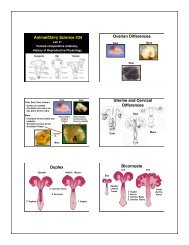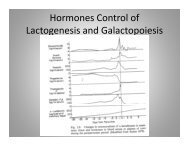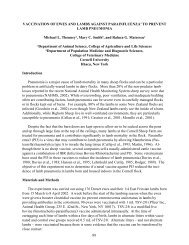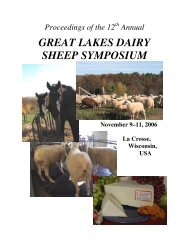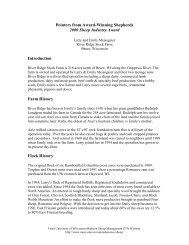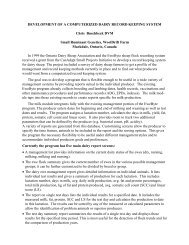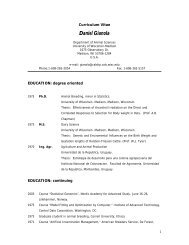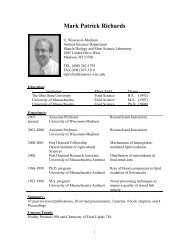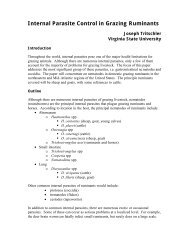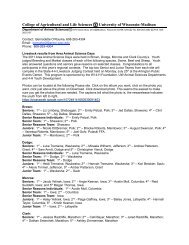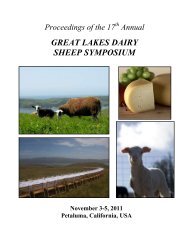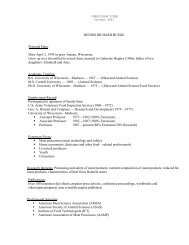Dairy Sheep Symposium - the Department of Animal Sciences ...
Dairy Sheep Symposium - the Department of Animal Sciences ...
Dairy Sheep Symposium - the Department of Animal Sciences ...
Create successful ePaper yourself
Turn your PDF publications into a flip-book with our unique Google optimized e-Paper software.
Grade B milk quality is as follows:<br />
1. Standard Plate Count (SPC) shall be 300,000 per ml or less.<br />
2. Somatic Cell Count (SCC) shall be 1,000,000 per ml or less.<br />
3. Milk shall be free <strong>of</strong> antibiotics as determined by utilization <strong>of</strong> one <strong>of</strong> <strong>the</strong> following antibiotic<br />
screening tests:<br />
• Charm Bs Da<br />
• Charm II Sequential<br />
• Delvotest P<br />
• Idexx Snap-BL<br />
• Penzyme Milk Test<br />
It should be noted that at this time <strong>the</strong>re are no FDA approved drug screening tests for sheep<br />
milk. However, <strong>the</strong>se tests are approved for goat milk, and <strong>the</strong> Food Division has made <strong>the</strong><br />
decision that <strong>the</strong>se tests are <strong>the</strong> most appropriate to be used to test sheep milk.<br />
Milk not meeting <strong>the</strong>se quality standards shall be rejected.<br />
Permitting<br />
Grade A farms are not only licensed, but also permitted with a grade A permit. Farms wishing<br />
to become grade A must meet all <strong>the</strong> requirements <strong>of</strong> grade B farms plus <strong>the</strong> water supply<br />
must be inspected and comply with NR 112. The grade A requirement is only necessary if <strong>the</strong><br />
milk is being processed into a grade A product. Grade A products are as follows: fluid milk,<br />
yogurt, sour cream, cream, half and half, buttermilk, and any variation <strong>of</strong> <strong>the</strong>se products.<br />
If <strong>the</strong> grade A permit is required, and <strong>the</strong> milk or milk product crosses state lines, <strong>the</strong> farm<br />
will also come under scrutiny by <strong>the</strong> Wisconsin <strong>Department</strong> <strong>of</strong> Health and Family Services and<br />
<strong>the</strong> FDA. These agencies regulate farms through <strong>the</strong> Pasteurized Milk Ordinance and <strong>the</strong> Interstate<br />
Milk Shippers list.<br />
The grade A quality standards for sheep milk are:<br />
• SPC – 100,000 per ml or less<br />
• SCC – 1,000,000 cells per ml or less<br />
• Antibiotic tests negative<br />
Grade A farms in Wisconsin are inspected on a “risk based” farm inspection program. Farms<br />
are classified by on site inspections and quality counts into one <strong>of</strong> four categories each having a<br />
different inspection frequency. The frequencies are as follows:<br />
• Category 1 every 12 months<br />
• Category 2 every 6 months<br />
• Category 3 every 4 months<br />
• Category 4 every 3 months<br />
Inactive Farms<br />
Normally cow dairies in Wisconsin are allowed six (6) months <strong>of</strong> dormancy or “dry status”<br />
before <strong>the</strong> farm license is revoked. Since grade B sheep dairies are dry for approximately eight<br />
(8) months, <strong>the</strong> Food Division has waived this rule. Grade A farms are allowed only two (2)<br />
months <strong>of</strong> inactivity before <strong>the</strong> permit is revoked. This requirement has not been waived and<br />
<strong>the</strong>refore grade A sheep dairies must be permitted every year.



